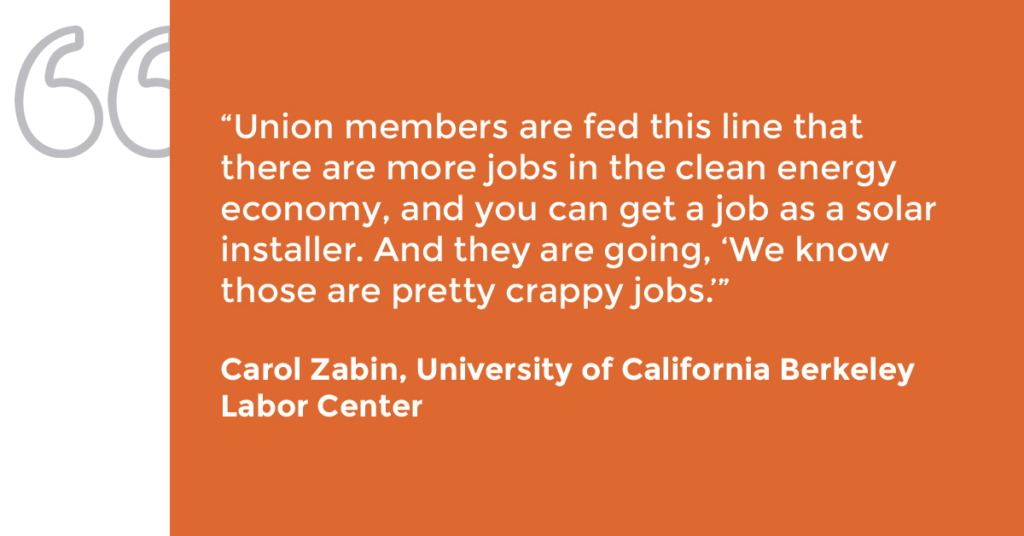Activists and politicians aiming to shut down oil and gas production in California all parrot a common refrain: Workers whose jobs are eliminated will simply ‘transition’ to a new green job.
But a study commissioned by the State Building and Construction Trades Council of California released last fall sheds light on what those ‘green jobs’ look like – and it isn’t pretty.

As the Trades Council wrote in a letter to legislators accompanying the study: “Workers keep hearing about all the green jobs that will be created in California … [but] green jobs just do not create family-sustaining wages like the oil and gas industry.”
The letter summarized simply: “We cannot afford to trade apples for oranges, especially when the oranges cannot support a family in California.”
The Trades Council study found:
- Green jobs pay less and are less secure: Data shows that “significant pay differentials exist across a range of occupations between the green and oil and gas industries.” Average pay rates in green jobs, as defined by federal and California agencies, are between 30% and 45% lower than the average pay rate for oil and gas industry jobs in comparable counties. The study states: “Working-class families facing the elimination of oil industry and allied construction jobs, many held by union members, would be particularly vulnerable to major reductions in pay and benefits, even after going through job retraining programs. The green ‘replacement’ jobs may also be parttime or temporary, with less stability than industrial jobs in oil and natural gas production.”
- Green jobs would be hurt by a shutdown of oil and gas production: The study points out that most green jobs are tied to the general health of the California economy, and therefore “would be negatively affected by policies phasing out oil and gas production and mandating a shift to more expensive and less-reliable renewable energy.” These policies would depress economic growth in California, particularly in the San Joaquin Valley and Los Angeles and Ventura Counties, and increase the state’s already high cost of living, making it more difficult for green job growth to occur.
- Green manufacturing is not likely to provide enough ‘replacement’ jobs for blue collar workers in California: “Most renewable equipment is produced outside of California and, more generally, California manufacturing jobs have declined by nearly one-third over the past three decades because of the state’s high costs, taxes and constantly changing regulatory requirements. We would expect these trends to intensify under expanded renewable energy mandates due to higher costs for energy and reliability challenges.”
Given these factors, the study concluded that “it is unlikely that the growth in green jobs would replace either the quantity or quality of oil and gas industry jobs, or the overall economic contribution lost through a phase-out of oil and gas production.”
The Trades Council study mirrored reporting from The Sacramento Bee, which found: “Even as the number of clean energy jobs rises in California, the quality of those positions vary wildly.” The Bee’s reporting quoted Carol Zabin, director of the Green Energy Program at the University of California Berkeley Labor Center, who said: “Union members are fed this line that there are more jobs in the clean energy economy, and you can get a job as a solar installer. And they are going, ‘We know those are pretty crappy jobs.’”
Yet in addition to not having a real jobs plan for affected workers, oil and gas shutdown advocates fundamentally dismiss concerns about their policies harming working families. As a Sierra Club representative wrote in the Bakersfield Californian, clean energy policies “have been met with much fear and loathing … from sectors that depend on the economic support of fossil fuel extraction, production and distribution, and those who take comfort in the notions and practices of the past.”
The rep argued carelessly that “like jobs in the oil patch, sustainable carbon free energy won’t happen without employees” – failing to understand or even consider what those replacement jobs might actually look like for working families.
The oil and gas industry directly employs 152,000 people in California. Those workers make $80,500 a year on average, and two-thirds don’t have a bachelor’s degree.
Radical activists and allied politicians calling for a ‘just transition’ are calling for oil and gas workers to take 45% less pay, fewer benefits and less security in their jobs – if they can get one at all.


